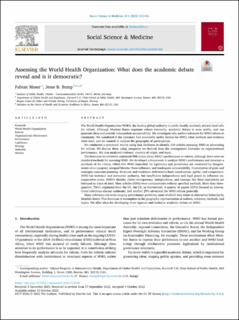| dc.description.abstract | The World Health Organization (WHO), the leading global authority in public health, routinely attracts loud calls for reform. Although Member States negotiate reform internally, academic debate is more public, and can generate ideas and provide independent accountability. We investigate why authors advocate for WHO reform so commonly. We wondered if this literature had potentially useful themes for WHO, what methods and evidence were used, and we wanted to analyze the geography of participation.
We conducted a systematic review using four databases to identify 139 articles assessing WHO or advocating for reform. We discuss these using categories we derived from the management literature on organizational performance. We also analyzed evidence, country of origin, and topic.
The literature we reviewed contained 998 claims about WHO's performance or reform, although there were no standard methods for assessing WHO. We developed a framework to analyze WHO's performance and structure a synthesis of the claims, which find WHO imperiled. Its legitimacy and governance are weakened by disagreements about purpose, unequal Member State influence, and inadequate accountability. Contestation of goals and strategies constrain planning. Structure and workforce deficiencies limit coordination, agility, and competence. WHO has technical and normative authority, but insufficient independence and legal power to influence uncooperative states. WHO's identity claims transparency, independence, and courage, but these aspirations are betrayed in times of need. Most articles (88%) were commentaries without specified methods. More than three-quarters (76%) originated from the US, the UK, or Switzerland. A quarter of papers (25%) focused on international infectious disease outbreaks, and another 25% advocated for WHO reform generally.
Many criticisms cite wide-ranging performance problems, some of which may relate to obstructive behavior by Member States. This literature is incomplete in the geographic representation of authors, evidence, methods, and topics. We offer ideas for developing more rigorous and inclusive academic debate on WHO. | en_US |

